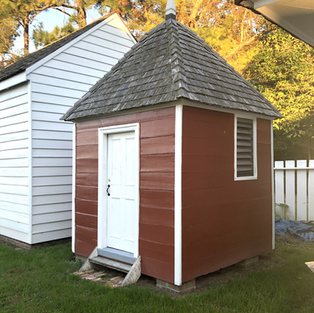Family Politics in North Carolina
- Mandy-Gentry

- Nov 22, 2020
- 4 min read
Visiting Edenton, North Carolina, was especially exciting for me. Many of my ancestors lived in Edenton during the formative years of our country, and they shaped a web of prominent political figures with significant impacts on our nation. Several of their homes still remain as historical sites.
The Iredell House
When we arrived at the Iredell House, it was closed to visitors. We stopped by the historical visitor center nearby, and I mentioned the family connection. (James Iredell Sr. is my 5x great grandfather.) They were so kind to set up a private tour for us to view the Iredell house and learn more about our family history. Being a history nut with a fascination for researching our family trees, this was such an amazing experience.
A BRIEF HISTORY:
James Iredell Sr. was a political essayist, lawyer, leading Federalist in North Carolina and was appointed as one of the original justices of the United States Supreme Court. Born in England, he emigrated to America at age 17 and served as comptroller at Fort Roanoke (now Edenton.) He was admitted to the bar in 1770 and emerged as the most influential political essayist in Revolutionary North Carolina. He served as Attorney General of North Carolina from 1779 - 1782, and was a vigorous supporter of the Revolutionary War. After the war, he led the fight to have North Carolina ratify the U.S. Constitution. In 1790, President George Washington appointed Iredell as a justice to serve on the first Supreme Court of the United States. His opinion helped establish the principle of judicial review - the power of courts to decide the validity of acts of legislative and executive branches of government. He served for nine years until his death in 1799.
His son, James Iredell Jr., followed in his father's political and law footsteps. He served as the 23rd Governor of North Carolina, was in the U.S. Senate, and was court reporter for the North Carolina Supreme Court from 1840 - 1852.
______________________
Inside the Iredell home there were several wonderful details preserved - letters open on his desk, family portraits, furniture, guns and more. Our wonderful tour guide was so kind to take time to talk through specifics with us about the Iredell family, the history of the home, and what life was like for them.
The kitchen was housed in a separate building, just behind the main house. Inside was a massive fireplace that took up nearly one wall. On the exterior of the structure, that entire back was was brick. So many tools original to that time were present and just fascinating to see.
Also on the property was a small schoolhouse from a neighboring plantation. A few wooden benches were inside with little chalkboards for the students. At the front of the room was a fireplace and the teacher's desk. The schoolmaster's living quarters were above the classroom in the small loft.
There were several other structures on the property that we were able to tour - a smokehouse, outdoor bathroom, slaves quarters, dairy pantry, and carriage house.
The Edenton political upper-class were intertwined with marriages, consequently I am related to many of the former residents of this historically bustling community.
Samuel Johnston's Home - The Hayes Plantation

James Iredell Sr. studied law under Samuel Johnston, a future North Carolina governor and one of its first two U.S. Senators. Iredell married Samuel Johnston's sister, Hannah, in 1773. When James Sr. died in 1799, James Jr was only 11. He grew up under the tutelage of his uncle, Samuel Johnston, which probably also helped form his future career in law and politics.

Born in Scotland, Samuel Johnston came to new world at the age of three. He obtained his education in New England, served in the NC Colonial General Assembly, and as the NC Clerk of Superior Court. He presided over the 3rd and 4th Provencial Congresses. North Carolina sent Samuel Johnston as a delegate to the Continental Congress in 1780 and 1781. He was elected the first President of the United States in Congress assembled under the Articles of Confederation, but he declined the office.
Samuel Johnston served as Governor of North Carolina from 1787 to 1789. He presided over both conventions called to ratify the U.S. Constitution. Johnston resigned as governor to become one of North Carolina's first two U.S. Senators, serving from 1789 until 1793. In 1800 he was made a Judge in the Superior Court of North Carolina, and was known as one of the outstanding citizens of the state and a sound lawyer.
The Johnston's home in Edenton, referred to as the Hayes Plantation, is nestled in the trees along the bay waters outside of the historic downtown. On the estate is the Johnston family cemetery, which is the final resting place for the Johnstons, the Iredells, as well as several other members of my ancestral tee including the Tredwells and Blaires. Also buried there are the Barkers. Penelope Barker organized the famous Edenton Tea Party and was the first recorded women's political demonstrator in America.
The Hayes Plantation still functions as a private residence, so it is not open for tours. We did however sneak onto the estate to see the family cemetery.
This whole delve into my family history here in Edenton was truly touching and captivating. It's hard to wrap your mind around so much history in one place.
Edenton is so rich in history, we really only scratched the surface of what this incredibly historical little town has to offer. Be sure to check out a few other places were visited in our blog post HERE.












































































































































Comments